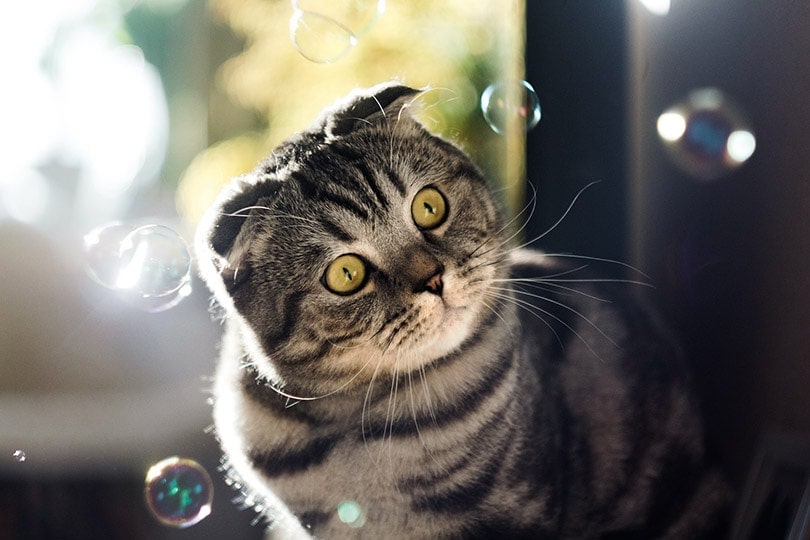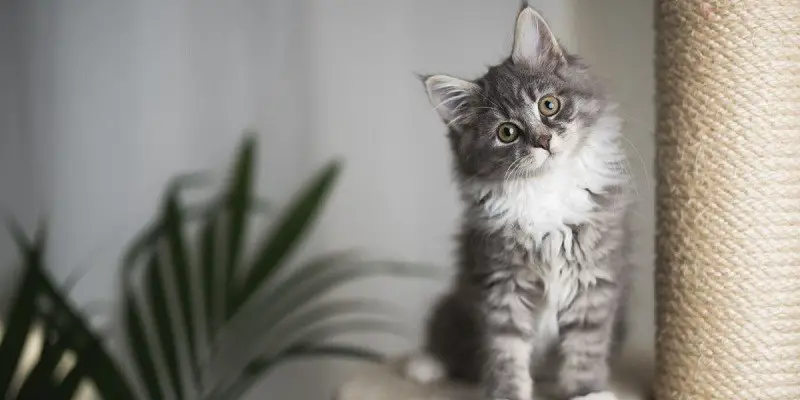Cats tilt their heads to better hear sounds coming from different directions and to focus their attention on a specific noise or object. This behavior is a natural instinct for cats and is not necessarily a cause for concern.
Cats have incredibly acute hearing abilities, and they use this sense to navigate their surroundings, track prey, and communicate with other cats. Tilting their heads helps them pinpoint the source of a sound and determine its location and distance. Additionally, cats tilt their heads when trying to understand something that seems unfamiliar or confusing to them, such as a new object or person in their environment.
If you notice your cat excessively tilting their head or showing other signs of discomfort or disorientation, it is best to consult with a veterinarian to rule out any potential underlying medical issues. Otherwise, enjoy watching your feline companion explore and interact with the world through their unique and curious perspective.

Credit: www.hepper.com
The Science Behind Head Tilting Of Cats
Cats are known for their quirky and amusing habits, one of which is the adorable head tilt. While it may look cute and harmless, there’s actually a lot of science behind this feline behavior. In this blog post, we’ll dive into the reasons why cats tilt their heads, exploring the role of inner ear and vestibular system, how cats use their senses, and how this behavior can be a sign of health issues.
What Happens When Cats Tilt Their Heads?
Head tilting is a common behavior for cats, and it usually happens when they hear or see something that piques their interest. Cats have excellent hearing and use their ears to locate sounds, and the head tilt helps them to pinpoint the source of a particular noise.
When cats tilt their heads, they also adjust their peripheral vision, which allows them to focus their attention on a particular object. This behavior is similar to how humans tilt their heads when trying to get a better look at something.
The Role Of Inner Ear And Vestibular System
The inner ear and vestibular system play a vital role in the head tilting behavior of cats. These systems are responsible for regulating balance and spatial orientation, and any disruption to these systems can cause a cat to tilt its head.
Certain conditions like ear infections, vestibular disease, and trauma to the head can all affect a cat’s inner ear, leading to head tilting behavior. In cases where the head tilting is severe or accompanied by other symptoms such as loss of balance or nausea, it’s essential to seek veterinary attention.
Explanation Of How Cats Use Their Senses
Cats are incredibly sensory creatures, and they rely on their senses to navigate their environment. When it comes to head tilting behavior, cats use both their hearing and sight to get a better understanding of their surroundings.
Their ears are designed to swivel independently, allowing them to locate the source of a sound accurately. Additionally, cats have exceptional vision, and they can detect even the slightest movement. When they tilt their heads, it helps them to focus on what they’re seeing better.
How Head Tilting Can Be A Sign Of Health Issues
While head tilting is often harmless and temporary, it can sometimes be a sign of more severe health issues. As mentioned earlier, inner ear problems and vestibular disease can cause head tilting behavior, but it can also be a symptom of neurological conditions and even cancer.
If you notice your cat tilting its head frequently, it’s crucial to observe other symptoms and behaviors. For example, disorientation, vomiting, and loss of balance can all be signs of a more severe underlying issue.
While head tilting is an adorable and quirky behavior for cats, it can also be an indication of an underlying health issue. As a pet owner, it’s crucial to monitor your cat’s behavior, and seek veterinary attention if you notice any concerning symptoms.
The Reason Why Cats Tilt Their Head Towards Sounds And Objects
Cats are fascinating creatures with an innate curiosity that often leads to them tilting their heads towards different sounds or objects that attract their attention. Whether it’s a bird chirping outside a window or a toy rustling on the floor, cats will instinctively tilt their head in the direction of the sound or object to better understand it.
But why do cats tilt their heads? In this blog post, we’ll explore the reason why cats tilt their heads towards sounds and objects, along with other interesting facts about cat behavior.
The Instinctive Behavior Of Cats
Cats have an instinctive behavior that helps them survive in the wild. They are natural predators and use their acute sense of hearing to detect prey and potential threats. Tilting their head allows them to triangulate the source of the sound, giving them a better idea of the location and distance of the object or prey.
This behavior is also present in domestic cats, even though they may not need to hunt for survival.
The Role Of Curiosity And Exploration
Cats are notoriously curious creatures, and they love to explore their environments. Tilting their head is one way they can gather more information about their surroundings. By changing the angle of their head, they can improve their visual field and get a new perspective on their environment.
This also helps cats to navigate their environment and avoid potential obstacles.
Training Cats To Respond To Different Sounds
Cats can be trained to respond to different sounds, including their name, and commands, with positive reinforcement training. By associating a particular sound with a reward or treat, cats can learn to tilt their heads towards the source of the sound, indicating that they understand the command or behavior expected of them.
The Connection Between Head Tilting And Hunting Techniques
Head tilting is also connected to cats’ hunting techniques. When cats are stalking prey, they tilt their heads to the side, keeping their bodies low to the ground. This posture helps cats to remain hidden from their prey and to keep them in their line of vision.
The same behavior is seen in domestic cats playing with toys or chasing a laser pointer, as they still have the instinctive behavior of a hunter.
Head tilting is a natural and instinctive behavior for cats. It allows them to gather more information about their surroundings and to better locate potential prey or danger. With positive reinforcement training, cats can also be trained to respond to different sounds.
Understanding this fascinating behavior can help cat owners better understand their feline companions and deepen their relationships with them.
How To Interpret Cat’S Head Tilt And When To Be Concerned
Why Do Cats Tilt Their Heads?
Cats have a natural charm and quirkiness that seems to never fail in amusing us. Cat’s head tilting is one of the many funny things they do. It seems like they are trying to give us a message, but what is the meaning?
In this blog post, we will explore the reasons behind a cat’s head tilt and how to interpret it. We will also cover when to worry about your feline friend’s head tilt and offer guidelines on managing potential health issues.
The Importance Of Observing Cat’S Body Language
Cats communicate through body language, including their head movements and positioning. Observing these subtle gestures is critical for understanding your cat’s feelings and behavior. Their head tilt could signify a variety of different emotions and physical symptoms, ranging from contentment to serious health issues.
Below are some common head tilts and what they could mean:
- Slow head turns: Your cat is relaxed and comfortable.
- Rapid head jerks: This can indicate fear or anxiety.
- Tilted head with a flick of the ear: Your cat is curious and focused on something.
- Tilted head with a squinted eye: Can be a sign of pain or discomfort.
Understanding your cat’s behavior can help establish a strong bond and relationship between the two of you.
Common Signs Of Distress In Cats
Cats are notorious for disguising their pain and discomfort, but there are common signs to look out for that could indicate distress. If your cat has been tilting their head excessively, it could be a symptom of an underlying health issue.
Below are some non-behavioral indications of cat’s distress:
- Unusual vocalization
- Lack of appetite
- Loss of balance or coordination
- Eye or ear discharge
Depending on the severity of these symptoms, it is advisable to seek veterinary care promptly.
When To Seek Veterinary Help
If your cat’s head tilt persists for more than a few hours or if it is accompanied by other symptoms such as vomiting or seizures, you must call your veterinarian. Some of the potential health issues that may be related to head tilting in cats are ear infections, vestibular syndrome, or neurological problems.
Techniques To Prevent And Address Potential Health Issues
Here are some common techniques to help prevent or address potential health concerns related to head tilting:
- Keep your cat’s ears clean
- Gently examine your cat’s ears for any unusual signs of discharge or swelling
- Practice regular grooming and clipping your cat’s nails
- Ensure your cat has access to fresh water and a healthy diet
Cats’ head tilting is a common gesture that may signify various emotions and health issues. As their companion, understanding their body language is significant in identifying concerning behavior and promoting their health and well-being. Remember, when in doubt, seeking veterinary attention is the best course of action.
Frequently Asked Questions Of Why Do Cats Tilt Their Heads?
Why Do Cats Tilt Their Heads?
Cats tilt their heads to improve their hearing and locate sounds better.
Is Head Tilting Normal In Cats?
Yes, head tilting is normal in cats. It’s a common behavior associated with adjusting their ears.
Are There Medical Reasons For Head Tilting In Cats?
Yes, medical conditions such as ear infections or brain diseases can cause head tilting in cats.
How Can I Tell If My Cat’S Head Tilting Is A Medical Concern?
If your cat’s head tilting is accompanied by other symptoms like loss of balance or disorientation, consult your vet.
Can Head Tilting In Cats Be Prevented?
Preventing head tilting in cats is difficult as it’s a natural behavior. But timely treatment of medical conditions can help.
Conclusion
Cats have a fascinating way of exhibiting their behavioral traits. One such behavior is tilting their heads. This action primarily helps them to adjust their eyesight and focus on a particular object or person. Additionally, it could also signify attention, curiosity, or an attempt to comprehend their surroundings.
However, excessive head tilting coupled with other symptoms can indicate underlying medical issues that require urgent attention from a veterinarian. As cat owners, understanding the intricacies of our feline friends’ behavior can help to detect any abnormalities when it comes to their health.
Therefore, it is important to observe our pet’s behavior closely and seek medical help when necessary. Overall, the mystery behind why cats tilt their heads will continue to fascinate us, but it is an essential aspect of feline behavior that we should appreciate and be aware of as pet owners.
Last Updated on January 14, 2025 by Pauline G. Carter

